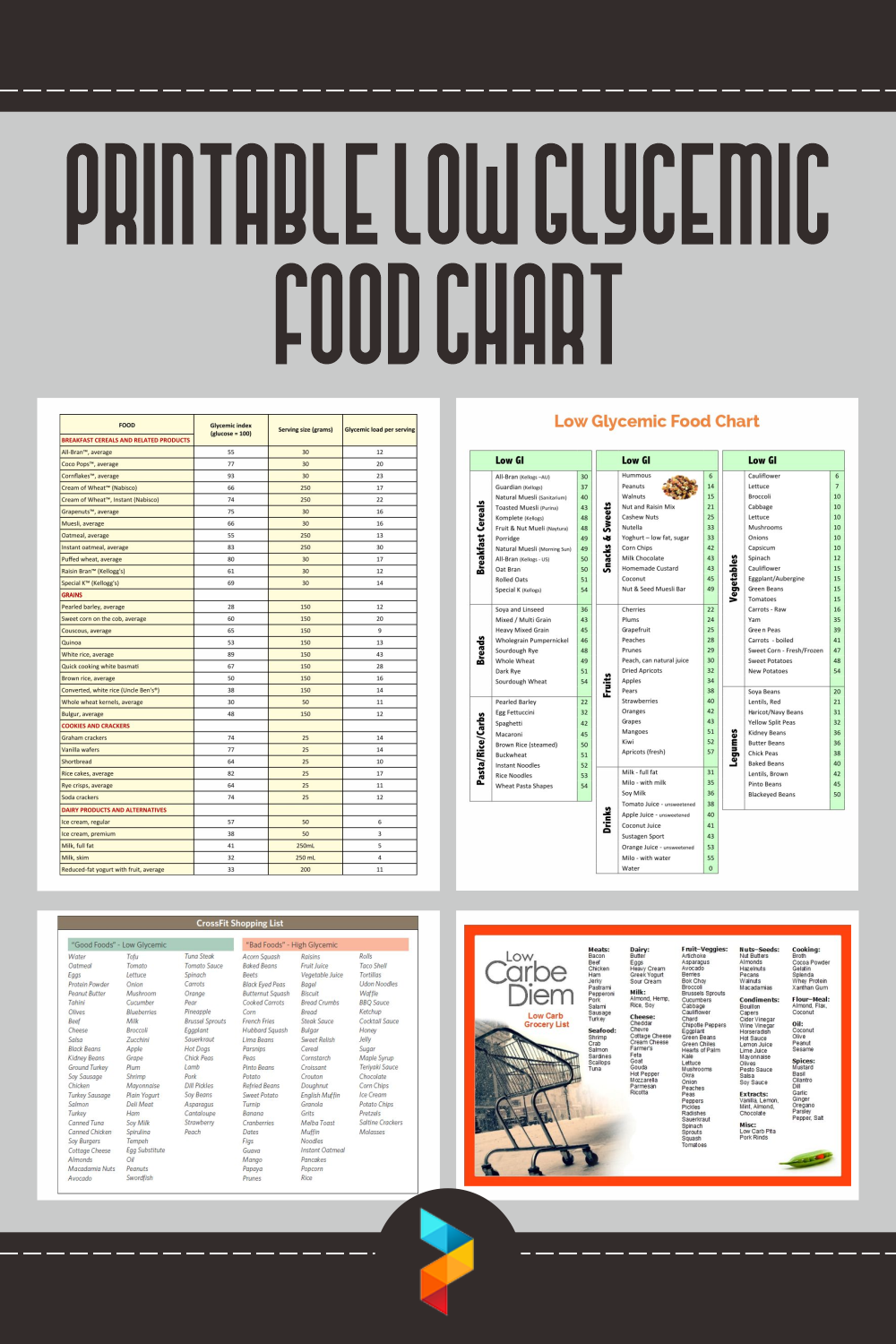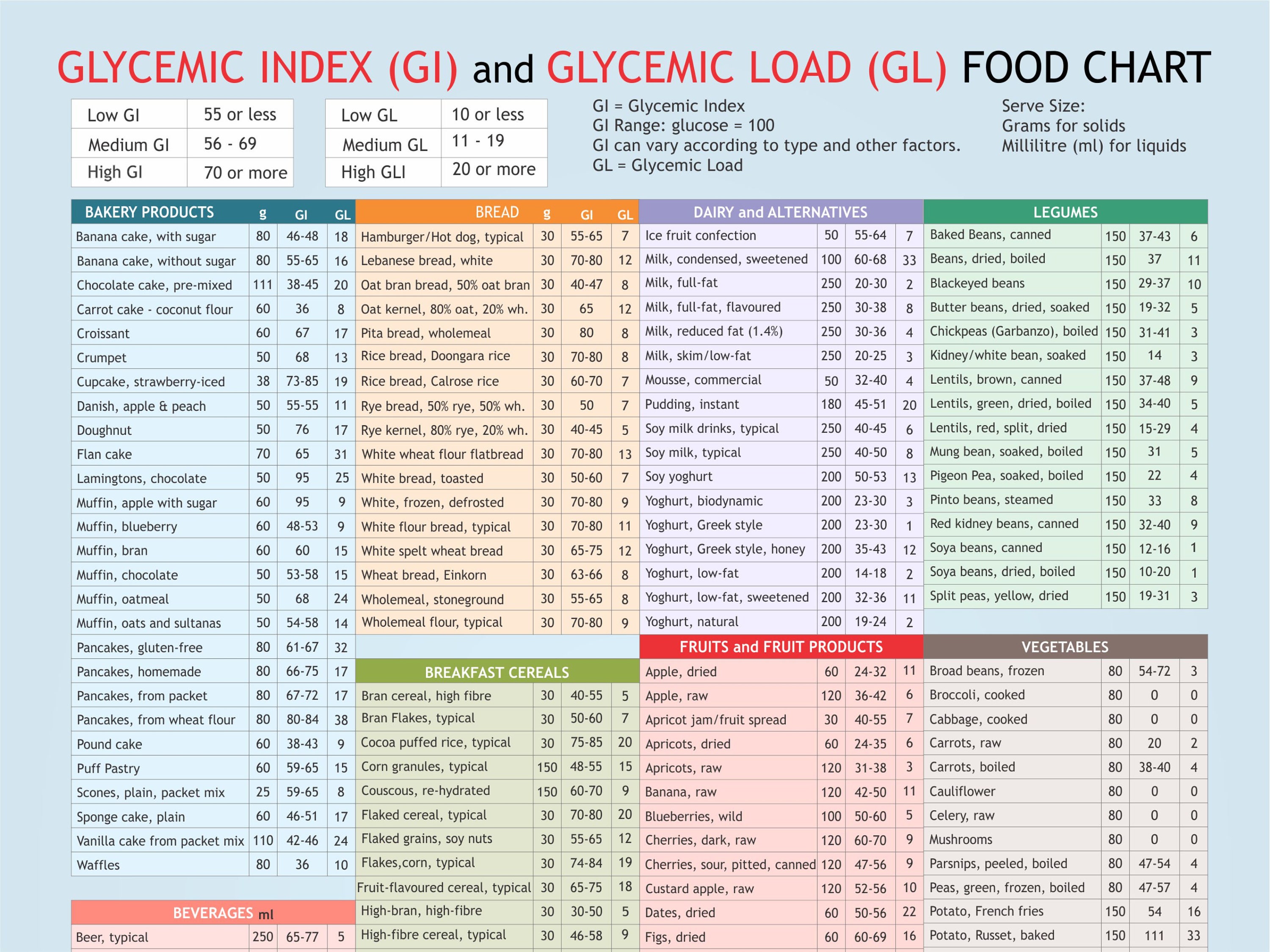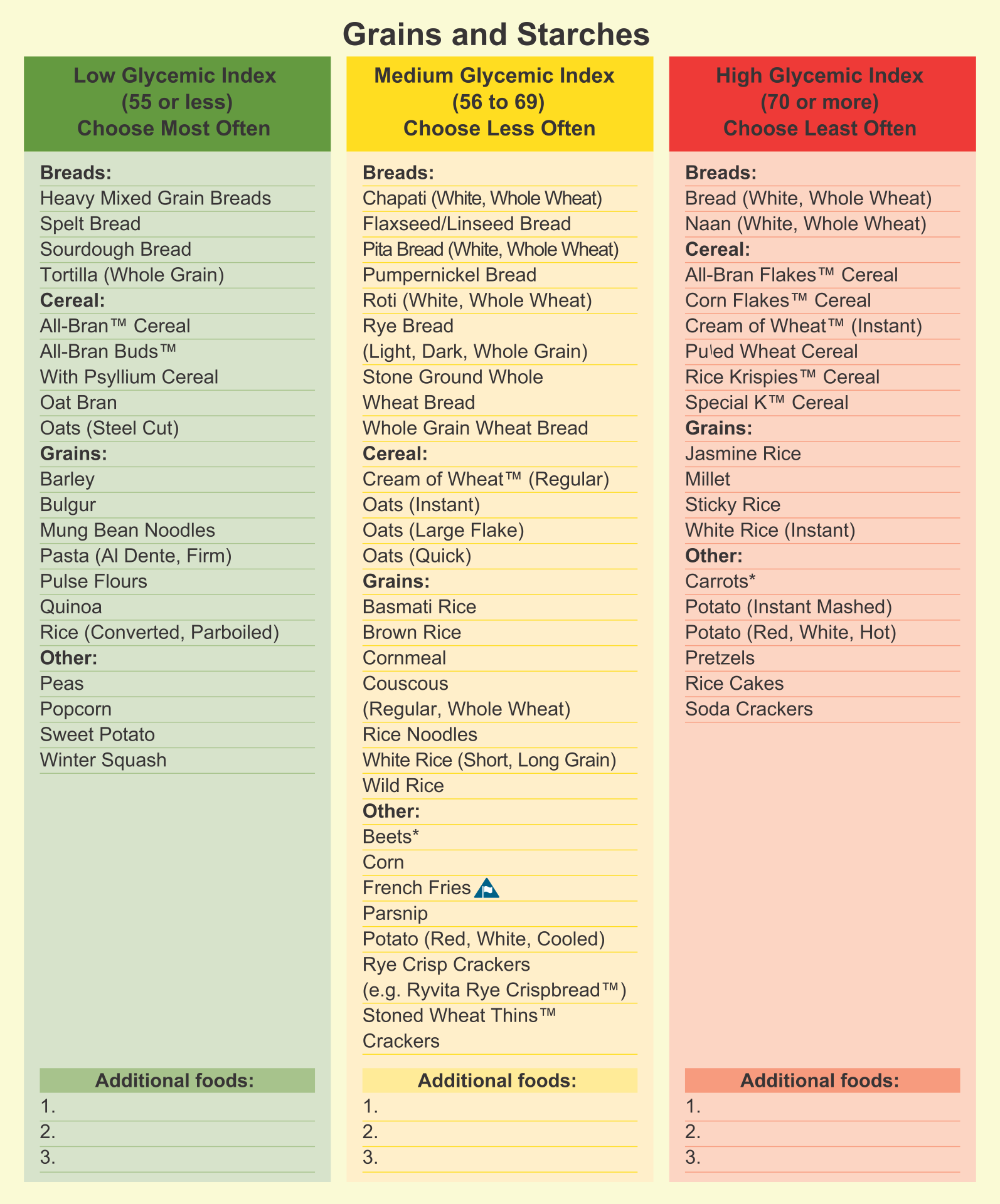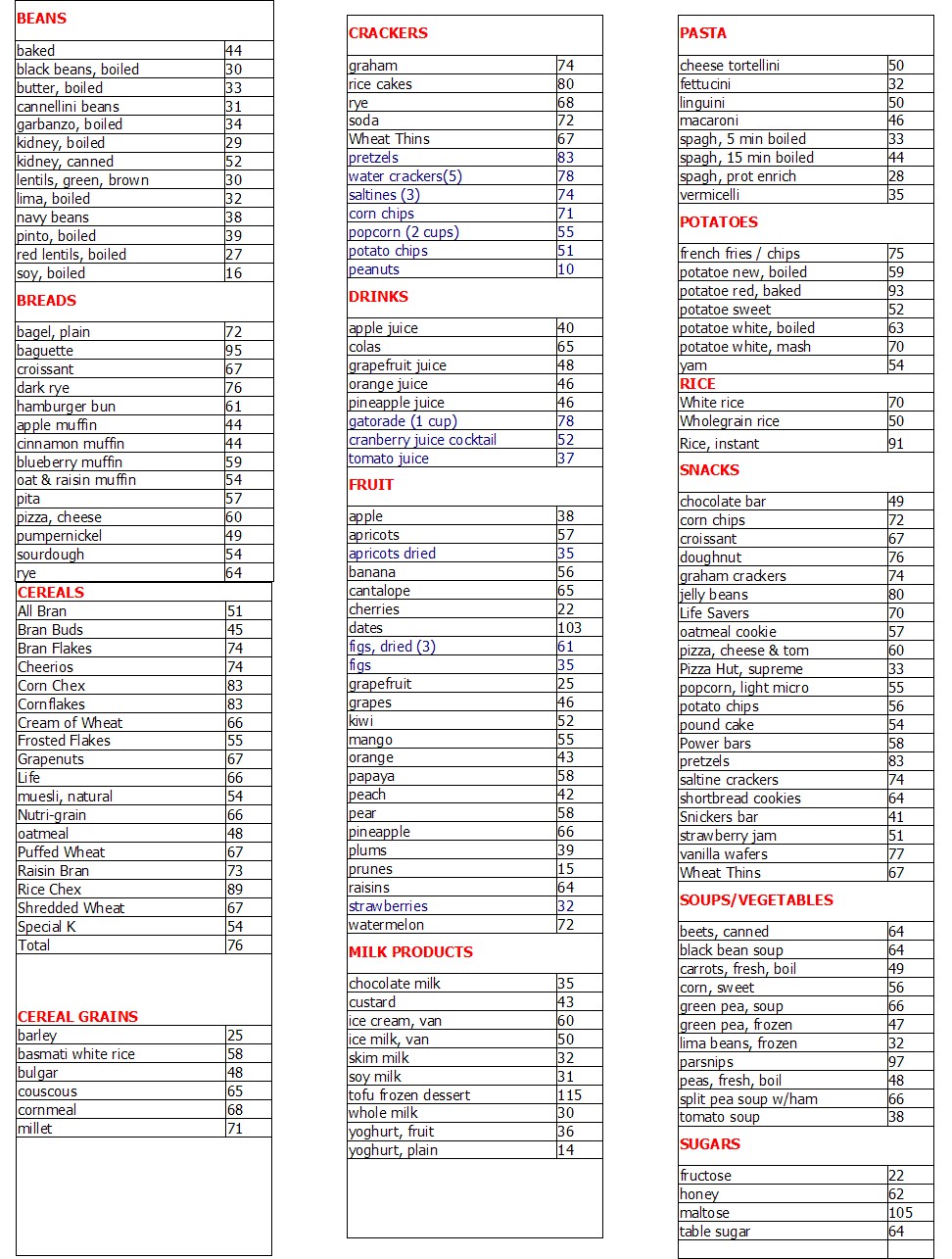Printable Glycemic Index Food Chart
Printable Glycemic Index Food Chart - Complete up to date table of glycemic index values collected from all available studies. Low glycemic foods slow down sugar absorption, helping in maintaining stable glucose levels. Work with your registered dietitian to find ways to substitute high gi foods for foods in the medium and/or low gi category. Eating foods with a lower gi may result in a more gradual rise in your blood sugar level. Foods are categorized as low gi (55 or less), medium gi (56 to 69) and high gi (70 or more). The glycemic index (gi) is a measure of the effect carbohydrates have on blood glucose levels. For instance a food with a glycemic index of 30 doesn’t raise the blood glucose that much at all , but gi doesn’t consider how big the serving size is or how much you eat. Web this page provides a comprehensive gi index chart and their corresponding glycemic index and glycemic load values for easy reference. Web the glycemic index (gi) is a measure of how fast a food raises the blood sugar level. Web the glycemic index classifies foods that contain carbohydrates according to their potential to raise blood sugar. Eating foods with a lower gi may result in a more gradual rise in your blood sugar level. Because carbohydrates, or carbs, such as rice, pasta, bread, and fruit, raise blood sugar more, and more quickly, than fats or proteins do. This is a function of the type and. Web the glycemic index, or gi, uses a scale of numbers from 1 to 100 to rank carbohydrate foods by how quickly a serving size of each raises blood sugar. Web the glycemic index charts below lists common foods followed by their serving size and glycemic index number, according to the gi database compiled by the university of sydney and cited by the usda. Low glycemic foods have a slower, smaller effect. Web the glycemic index (gi) chart for carbohydrates fruits: Web learn more about the glycemic index, which foods tend to cause a spike in blood sugar (or not) and the limitations of this measurement. Web the glycemic index chart below uses a scale of 1 to 100 for glycemic index and 1 to 50 for glycemic load values, glucose having the highest gi value of 100 and gl of 50. We have put together a glycemic index food chart. Web glycemic index chart. High glycemic foods result in a quick spike in insulin and blood sugar (also known as blood glucose). Web the glycemic index charts below lists common foods followed by their serving size and glycemic index number, according to the gi database compiled by the university of sydney and cited by the usda. Low glycemic foods slow. Web the best choices are fresh, frozen and canned vegetables and vegetable juices without added salt (sodium), fat or sugar such as: They are grouped according to range and food type. Web the glycemic index is a great measure of how much a certain food will effect your insulin levels. Web the glycemic index chart below uses a scale of. Web glycemic index chart. A low gi is a sign of better quality. Web learn more about the glycemic index, which foods tend to cause a spike in blood sugar (or not) and the limitations of this measurement. For instance a food with a glycemic index of 30 doesn’t raise the blood glucose that much at all , but gi. Gi chart for 600+ common foods that is updated constantly. Work with your registered dietitian to find ways to substitute high gi foods for foods in the medium and/or low gi category. Web learn more about the glycemic index, which foods tend to cause a spike in blood sugar (or not) and the limitations of this measurement. “the glycemic index. Low glycemic foods slow down sugar absorption, helping in maintaining stable glucose levels. This is a function of the type and. Web the glycemic index classifies foods that contain carbohydrates according to their potential to raise blood sugar. Eating foods with a lower gi may result in a more gradual rise in your blood sugar level. For instance a food. Web glycemic index chart. Because carbohydrates, or carbs, such as rice, pasta, bread, and fruit, raise blood sugar more, and more quickly, than fats or proteins do. The glycemic index (gi) is a measure of the effect carbohydrates have on blood glucose levels. The glycemic index of a food refers to the effect the food has on the body’s blood. Web the glycemic index (gi) chart for carbohydrates fruits: The glycemic index of a food refers to the effect the food has on the body’s blood sugar levels. Web below you will find a printable glycemic index chart in pdf format, featuring over 100 different foods and their corresponding gi values. There are three gi categories: This is a function. The glycemic index of a food refers to the effect the food has on the body’s blood sugar levels. Understanding the gi values of specific foods can help reduce harmful spikes in blood sugar, as sugars and carbohydrates are broken down and your metabolism releases insulin to aid in digestion. Web the glycemic index charts below lists common foods followed. Foods with a higher gi value are more likely to spike your blood sugar than foods with a lower gi. We have put together a glycemic index food chart. There are three gi categories: Web the glycemic index is a great measure of how much a certain food will effect your insulin levels. Foods are categorized as low gi (55. Blood sugar levels are raised after a person eats foods containing carbohydrates (sugars and starches). We have put together a glycemic index food chart. Web learn more about the glycemic index, which foods tend to cause a spike in blood sugar (or not) and the limitations of this measurement. Web the glycemic index is a great measure of how much. Understanding the gi values of specific foods can help reduce harmful spikes in blood sugar, as sugars and carbohydrates are broken down and your metabolism releases insulin to aid in digestion. For instance a food with a glycemic index of 30 doesn’t raise the blood glucose that much at all , but gi doesn’t consider how big the serving size is or how much you eat. Low glycemic foods slow down sugar absorption, helping in maintaining stable glucose levels. Web the glycemic index (gi) is a measure of how fast a food raises the blood sugar level. They are grouped according to range and food type. Foods with a high gi increase blood sugar higher and faster than foods with a low gi. High glycemic foods result in a quick spike in insulin and blood sugar (also known as blood glucose). Complete up to date table of glycemic index values collected from all available studies. Web learn more about the glycemic index, which foods tend to cause a spike in blood sugar (or not) and the limitations of this measurement. Blood sugar levels are raised after a person eats foods containing carbohydrates (sugars and starches). This is a function of the type and. Low glycemic foods have a slower, smaller effect. Web the glycemic index (gi) chart for carbohydrates fruits: Folks trying to manage blood sugar, lose weight, or just aiming for a healthier diet often find navigating food choices tricky. Web below you will find a printable glycemic index chart in pdf format, featuring over 100 different foods and their corresponding gi values. Web this page provides a comprehensive gi index chart and their corresponding glycemic index and glycemic load values for easy reference.Full Glycemic Index Food List Printable Chart
Full Glycemic Index Food List Printable Chart
Glycemic Index Chart 6 Free Templates in PDF, Word, Excel Download
Printable Pdf Printable Glycemic Index Chart
List Of Glycemic Index Foods Printable
Free Printable Glycemic Index Food Chart
Glycemic Index, Glycemic Load, Food List Chart, Printable Planner
Full Glycemic Index Food List Printable Chart
Printable Glycemic Index Food Chart
Full Glycemic Index Food List Printable Chart
Web Glycemic Index Chart.
One Way Of Looking At A Healthy Diet Is Considering Where Foods Fall On The Glycemic Index.
A Low Gi Is A Sign Of Better Quality.
Web The Glycemic Index Is A Great Measure Of How Much A Certain Food Will Effect Your Insulin Levels.
Related Post:









